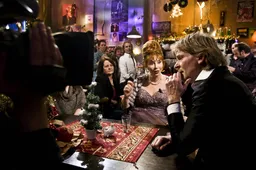Economist: bange volkje kiest voor bange leiders die niets gaan oplossen
Politiekvrijdag, 08 oktober 2010 om 00:00

De liberale, open en tolerante geest van Nederland wordt ten grave gedragen. Het rechtse kabinet van Rutte, Verhagen en gedoger Wilders ademt conservatisme op sociaal en economisch gebied, treurt The Economist. 'het nieuwe kabinet gaat niet de prblemen oplossen, maar de angst aanwakkeren. MEET the Netherlands. A small, affluent, densely populated northern European country, economically timid, with the potential for ethnic strife simmering just under its quiet surface. That is the picture painted by the agreement underlying the new Dutch centre-right minority government, consisting of the liberal VVD and the Christian Democrats. With the backbench support of the far-right Freedom Party and its leader, Geert Wilders (see Charlemagne), the new government will have a majority of just one in the 150-seat parliament. Mr Wilders has extracted a range of policy goodies in return for his support. The new government will ban the face-covering Islamic veil, and forbid police and workers in judicial institutions from wearing the headscarf. Immigration via marriage will be curbed. State subsidies for newcomers’ language courses will be turned into loans, and a failure to pass the subsequent tests could become grounds for a refusal to grant residence permits. The agreement is long on heavy-handed police tactics as a response to crime-ridden ethnically mixed neighbourhoods, but has nothing to say about poor infrastructure, school drop-out rates, skills shortages and low social mobility among both immigrants and natives in such areas. More surprisingly, the government has shunned any serious attempts at structural economic reform.
Mark Rutte, leader of the VVD and prime minister-in-waiting, campaigned on a pledge to revitalise the Dutch economy. But no substantial effort will be made to reform either the labour market or the inflated government-subsidised housing market. The generous pension system will remain, and the pension age will creep up by just a year, from 65 to 66, and then not until 2020. “This must be the most conservative and anti-reform economic programme we have had in the past 40 years,” says Sweder van Wijnbergen, professor of economics at the University of Amsterdam.
And despite the professed radical liberalism of both the VVD and Mr Wilders, there is a whiff of social conservatism to their vision for the country. Nobody questions issues such as euthanasia, abortion or gay marriage, considered to be private matters, but this liberal spirit will not extend to the public space—the famous coffee shops of Amsterdam will become members-only clubs closed to foreigners.
The ranks of the police will grow by 3,000, a policy which will please Mr Wilders. Under the new dispensation the Netherlands, traditionally a fairly outward-looking place, will adopt a more critical attitude towards the European Union. The government is likely to oppose Turkey’s EU membership bid, and will look sceptically on any further expansion of the club. Spending on foreign aid will be cut. Some observers expect that the new coalition, the first minority government in modern Dutch history, will fall apart at the first hint of trouble. But the parties may hold each other in a firmer grip than some expect. They are well attuned to the concerns of Dutch voters, many of whom, outside the big cities that are frequented by tourists, are a socially conservative bunch, anxious about the economic and social changes globalisation can bring. Instead of helping them to face up to today’s challenges, the government has chosen to play upon their fears.
POPULAIR NIEUWS

Wat zegt het over je als je je hond of kat bij je in bed laat slapen? Psychologen leggen uit

Donald Trump lijkt steeds kleiner

Oudere nummers verdwijnen eindelijk uit de Top 2000

Bild: Waarom Linda de Mol haar man heeft vergeven

Gourmetlucht in huis? Met deze tips ben je er snel vanaf

Russische bommenwerpers voerden vlucht uit boven Noorse Zee
Loading